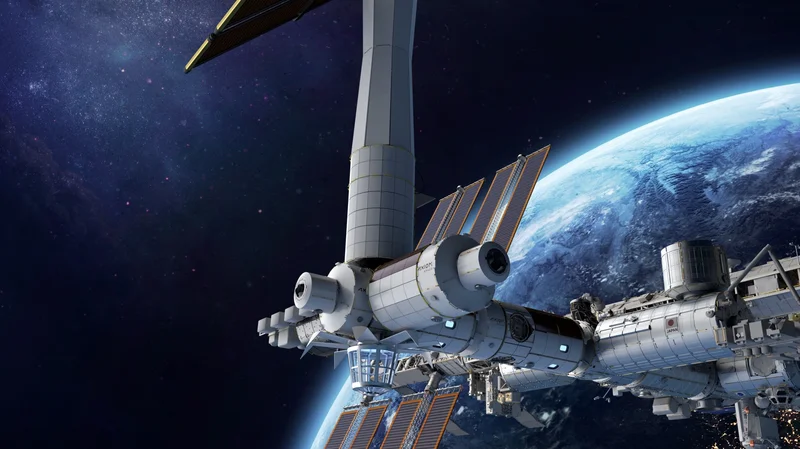Article Directory
Okay, folks, let's talk space. I know, I know, headlines are screaming about stranded astronauts and potential collisions. But before you dive into the doom and gloom, let's zoom out for a second and look at the bigger picture. Because what seems like a series of unfortunate events in China's space program might actually be the catalyst we need for a new era of cooperation and innovation.
The news is swirling: a Chinese space crew, Shenzhou-20, is temporarily stuck on the Tiangong space station because of suspected debris damage to their return capsule. Their return is postponed indefinitely, and that’s scary, no question. Then there's the near-miss satellite collision that China proactively addressed with NASA. On the surface, these feel like setbacks, right? But I see something different.
The Turning Tide
Let's start with the stranded astronauts. Nobody wants to be stuck in orbit unexpectedly, but the fact that the Shenzhou-21 crew successfully docked as replacements shows incredible redundancy and planning. And here's the kicker: if the capsule can't be repaired, the Shenzhou-20 crew will use the Shenzhou-21 team's capsule to return. Think about the implications! It's a backup plan built on a backup plan. It's like having a spare tire for your spare tire. Is this ideal? No! But it shows me that China is taking crew safety seriously, and that’s non-negotiable.
But here's where it gets really interesting. The near-miss satellite collision. We’ve been in a situation where NASA had to alert China of potential collisions. That’s been the status quo. But Alvin Drew, director for NASA Space Sustainability, revealed that the China National Space Administration (CNSA) reached out to NASA to prevent a possible collision. And that, my friends, is a paradigm shift. It's the first time that’s ever happened. Seriously, when I read that, I had to reread it again. China reached out to NASA to avoid a potential satellite collision in 1st-of-its-kind space cooperation
The Wolf Amendment generally limits interaction between NASA and Chinese state entities. To see them communicate like this shows me that space safety is superseding politics.
This isn't just about avoiding a fender-bender in orbit. This is about recognizing that space is a shared resource, a global commons, and that we all have a responsibility to protect it. It’s like recognizing that we all live downstream from each other, and we need to stop polluting the water.
Now, some might say, "Oh, China's just doing this because they have to, because they're launching more satellites." And maybe there's some truth to that. But does the why really matter as much as the what? The result is still the same: increased communication, increased coordination, and a safer space environment for everyone.
What does this mean? It means that we're starting to see the seeds of a global space traffic management system. Imagine a world where all spacefaring nations are sharing data, coordinating maneuvers, and working together to prevent collisions. That’s the dream, and it's a dream that suddenly feels a whole lot closer.

And let’s not forget Blue Origin offering to "move heaven and Earth" to help NASA reach the Moon faster. It's a reminder that even amidst competition, the overarching goal is to push the boundaries of human exploration. This collective drive, this shared ambition, is what will ultimately propel us forward.
What if this is all connected? What if the temporary setback with Shenzhou-20, coupled with the proactive communication from CNSA, is forcing a global conversation about space safety and cooperation? What if this is our "Sputnik moment," not in the sense of a technological shock, but in the sense of a wake-up call to work together?
A Future Forged in the Stars
I know, I know, I'm an optimist. But I genuinely believe that humanity's greatest achievements come from overcoming challenges. The Apollo program wouldn't have been possible without the Cold War, and maybe this new era of space exploration won't be possible without these initial stumbles.
And let's not forget the interstellar comet 3I/ATLAS. While some jumped to conclusions about it "changing color," the reality is that scientists around the globe, including China's Tianwen 1 Mars probe, are collaborating to study this cosmic wanderer. It's a testament to our shared curiosity and our desire to understand the universe, regardless of national boundaries. China's Tianwen 1 Mars probe captures images of interstellar comet 3I/ATLAS It's a testament to our shared curiosity and our desire to understand the universe, regardless of national boundaries.
What if studying 3I/ATLAS gives us insights into the origins of our solar system, or even the building blocks of life itself? The possibilities are endless, and they're all within reach if we continue to work together.
It's Not Competition, It's Collaboration in Disguise
I see all this, and I just can't help but feel a surge of hope. China's space program is ambitious, yes, but it's also pushing the boundaries of what's possible. And in doing so, it's forcing the rest of the world to step up its game. It’s like the early days of the internet, where innovation was driven by a mix of competition and collaboration.
But with immense power comes immense responsibility. As we venture further into the cosmos, we need to ensure that we're doing so ethically and sustainably. We need to protect the space environment from pollution and debris, and we need to ensure that all nations have access to the benefits of space exploration.
